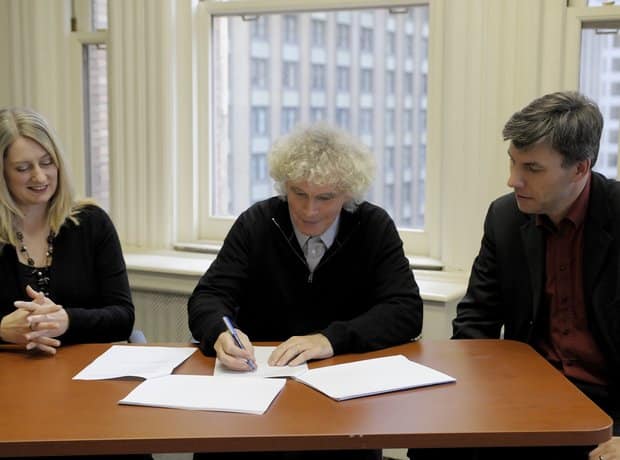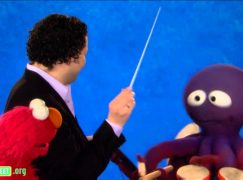Sir Simon Rattle writes
OrchestrasThe Sunday Telegraph has the rare gift of an article written by a grand conductor, the soon-departing music director of the London Symphony Orchestra.
The piece is behind a firewall but here’s a taster of Rattle’s writing style:
Recently, I came across an article which pointed out that of all the great composers, Igor
Stravinsky is the least known.
That seems a bizarre thing to say about a name everyone knows, but in fact it’s the same six
or eight pieces of his that are constantly played, particularly the three famous ballets – The
Firebird, Petrushka and The Rite of Spring. But there are so many other works that are totally
unknown, partly because they are really tiny, or they are scored for impractical combinations
of instruments that make them hard to programme. What do you do with a set of lullabies for
cats that needs three clarinets and a singer, or a set of nonsense songs that together last five
minutes? There’s no obvious home for these pieces, but they deserve to be heard, because
they’re so sharp and vivid and give such a flavour of the man…






Ultimately it’s all about Simon Rattle. Wow, the great Man [sic] has just discovered that there’s more to Stravinsky than the early Russian ballets. Give him a medal. This piffling pabulum (to use a stravinskian word) would disgrace a year 1 music student.
There seems to be not much love on the island for the man. I wonder if it were different, if he had chosen to take residence in his country of birth again. Many of the comments smell so old and sour…
Here tis. Judge for yourselves:
Recently, I came across an article which pointed out that of all the great composers, Igor Stravinsky is the least known.
That seems a bizarre thing to say about a name everyone knows, but in fact it’s the same six or eight pieces of his that are constantly played, particularly the three famous ballets – The Firebird, Petrushka and The Rite of Spring. But there are so many other works that are totally unknown, partly because they are really tiny, or they are scored for impractical combinations of instruments that make them hard to programme. What do you do with a set of lullabies for cats that needs three clarinets and a singer, or a set of nonsense songs that together last five minutes? There’s no obvious home for these pieces, but they deserve to be heard, because they’re so sharp and vivid and give such a flavour of the man.
So for my concerts, I wanted to create a life story, starting with some of the music Stravinsky wrote before he composed The Firebird in 1910 for the Ballets Russes, which made him an overnight sensation. There’s a beautiful set of early songs: The Faun and the Shepherdess, the brilliant Fireworks, and most extraordinary of all, the Funeral Song he wrote for the funeral of his teacher Rimsky-Korsakov. It had just one performance and after that the score vanished – much to Stravinsky’s regret, because he thought it was his best piece. Everyone assumed it was lost forever, but in 2015 it turned up in the basement of a library in St Petersburg. It’s fascinating, because although it’s clearly a work of genius it doesn’t really sound like Stravinsky; it actually reminds me of later Rachmaninov pieces such as the Third Symphony.
I couldn’t resist dropping in a few of the little character pieces from the two orchestral suites and the Four Etudes, such as Madrid, which is tiny but actually fiendishly difficult rhythmically. Like all his music, they’re full of memories of Russia such as the tradition of improvising nonsense poetry, and are proof that although you could take the man out of Russia – Stravinsky lived most of his life in exile, right up to his death – you couldn’t take Russia out of the man. The amazing thing is how Stravinsky could create something unforgettable in such a short time-frame – some of these pieces such as those Cat Lullabies last less than a minute. He liked to discipline himself by sticking sheets of music paper on the wall of his work room in a continuous row, starting and ending at the door. He would start composing at one end of the row, and knew he had to end when he arrived back at the door.
But there was also a deeply refined, lyrical side to him too, and to illustrate that I’ve included the beautiful Pas de deux from his ballet Apollo. It’s a reminder that Stravinsky had this way of expressing overwhelming emotion by almost not showing it. The music is hugely controlled – almost repressed – and that gives it an incredible power. You feel it especially in the religious music, where you get this extraordinary sense of something beyond this world.
Stravinsky had a fervent religious temperament – his friend Robert Craft tells us that he believed in the literal existence of the devil, with horns and a tail. And yet he conceives of God as totally outside our comprehension. We offer a taste of that side of Stravinsky in the two orchestral interludes from his final piece, the Requiem Canticles, from 1966. He asked for this extraordinary bell-ritual to be played at his funeral in Venice.
Since I took this on, the stature of Stravinsky has become even more clear to me. There are some creative personalities that are just so huge it’s very difficult to get them in proportion, and they end up standing for an entire era.
Think of visual art in the 20th century – the name everyone comes up with without thinking is Picasso. Stravinsky is on that level, and he was actually very like Picasso in the sense that he was able to keep his own personality while on the surface he was passing through an incredible variety of styles. There is also an underlying unity, which to me is like a distillation of everything it means to be a Russian, especially a Russian living through the upheavals of the 20th century. These little pieces give you all that, in a very human way. I hope it will feel something like having a conversation with the man.
One would suppose that he was writing for his audience.
The general readership of the Sunday Telegraph aren’t ignorant, surely, but they shouldn’t be expected to know as much about music as a music student does, even a first-year music student.
So no, Simon Rattle himself has not just discovered that there’s more to Stravinsky than the early Russian ballets — but it’s likely that some readers will discover that because of his article.
No doubt said article was written to promote some concerts he’s giving, but that’s fine. We do want people to come to such concerts, don’t we?
Not entirely fair. SR is writing for the general readership of the Sunday Telegraph (God help us and them) not for his Oxbridge fart-arsed tutor. “Pabulum” is not really a Stravinskian word but it would have been right up Craft’s lexical alley.
GIven that his teacher, John Carewe, is a pretty noted Stravinsky interpreter, I think it’s obvious that Rattle hasn’t just ‘discovered’ these for himself. He will probably know most of Stravinsky’s output pretty intimately and have done so since a teenager. He’s just trying to get other people interested in the lesser-known stuff.
Wow. You take one comment from him and treat it as if it is a summary of his entire knowledge. I expect we could sit with Rattle and talk long and wide and deep. The full article confirms my speculation about the depth. I wonder how long we could sit with Rob Keely before our toes get wet?
How absurdly cynical of you. Have you had some negative personal interactions with Rattle that cause this bitter spleen?
I’ve got no axe to grind with SR, so this sounds to me like a perfectly good comment/opinion about the shorter works of IS. It would be much more useful to find a different way to express whatever is trying to get out. Otherwise it just sounds like your bitching from jealousy which might what it is?
I wish more choirs would program Svadebka/Les Noces. It’s a difficult sing, but pretty great in its wild, knock-you-upside-the-head way.
I always thought Cesar Franck was the least known of the great composers.
I consider the finest tune I wrote ‘Happy Birthday’…my friend Serge loved it.
Simin Ratlle made a recording in 1978 on Chandos of a number of short Stravinsky pieces such as Three Japenese Lyrics. Worth searching out if you are interested.
I really don’t understand the hate. I’ve always admired Rattle’s zeal for communicating his love for great music to a wide audience. Perhaps that’s what irks the snobs, they want to keep it all to themselves.